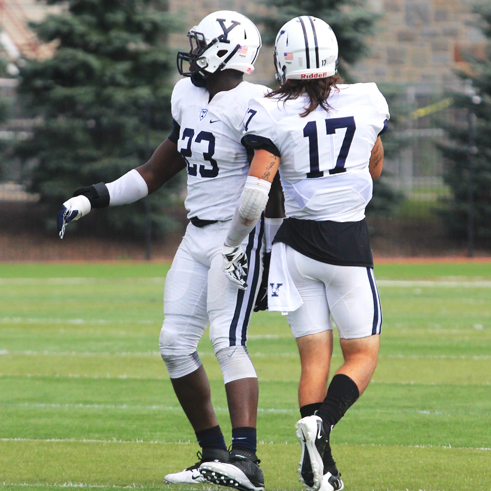
In late October of last year, The New York Times published a profile of running back Tyler Varga ’15, who was then five games and 709 yards into a record-breaking senior season. Thanks in part to the article — which detailed Varga’s extreme workout habits and unconventional diet — the Tupperware of rice that Varga brought to classes became part of the lore surrounding the current NFL tailback.
However, Varga was not the only member of the Yale football team to change his eating regimen with the hope of improving his play. Teammate and captain Deon Randall ’15, Yale’s all-time leader in career receptions, also adjusted his diet following his freshman year to gain a competitive advantage.
Though Randall and Varga have both graduated, their impact still resonates in the Yale football nutrition programs.
“Guys have changed how they’ve eaten in the dining halls,” head coach Tony Reno said. “They’re much more in tune with how much protein, how many carbohydrates they’re putting in their bodies. It’s a direct relation to what [Varga] and [Randall] did. They really put that whole plan together. We’ve obviously enhanced it in the last year, as we continually do.”
Crediting strength and conditioning coaches Emil Johnson and Mike Harris, Randall said the revamped nutrition program was a collaborative effort.
The plan is flexible enough that the Bulldogs, who per Reno’s team rules are required to live on campus for three years, can follow it in Yale’s dining halls. With mandatory team breakfasts and daily hydration minimums, the program includes when to eat, how often to eat, what to eat, alternative options and even allows for a “cheat day” a week, according to Randall.
“The dining halls and the administration at Yale, during my time as captain, played an integral role [in] helping us carry out this nutrition plan,” Randall wrote in an email to the News. “I’m sure it wasn’t always easy to feed 104 guys. They were always the most helpful and thoughtful when we asked for alternative options to carry out our nutrition plan.”
In addition to support from the dining halls and the coaching staff, the players have one another. The team eats together several times a week whether team-mandated or not, defensive back Foye Oluokun ’17 explained, and members hold one another accountable.
The plan is customizable based on whether the players want to gain, lose or maintain weight. Many freshmen enter Yale relatively underdeveloped physically, said Oluokun, who missed last weekend’s game against Dartmouth with a shoulder injury. While they tend to hit their pre-established weight goals by sophomore year, their muscular builds are often not where they need to be. In these situations, players are able to adjust their specific health plans to gain muscle mass.
“I wasn’t necessarily giving up [types of food], just cutting back,” Oluokun, who began working with a nutritionist in the offseason, said. “Within a week, I saw my weight go down five pounds. That’s just from eating less junk, more of the healthier stuff. I was surprised and got a little worried but the numbers in the weight room didn’t go down.”
Oluokun, a self-described fan of cheeseburgers, began cutting down on habits such as soda at breakfast in favor of healthier options. The defensive back experimented with different types of salads and ultimately found one — complete with grapes, carrots, apple chunks and Worcester sauce — that he likes.
The changes in eating habits have not gone unnoticed. Reno joked that while Oluokun used to eat like Seattle Seahawks running back Marshawn Lynch — famous for consuming Skittles on the sidelines of games — the junior has changed his diet for the better.
Oluokun said that as a result of the decrease in body fat, both his top speed and lateral quickness have improved.
Oluokun is hardly the only Eli who modified his nutrition plans. Running back Candler Rich ’17, who has been sidelined the past two weekends, and defensive back Spencer Rymiszewski ’17 also packed on 15 pounds of muscle in the offseason, according to Reno.
The changes made by the three juniors, in the footsteps of Randall and Varga, indicate a shift in team culture toward more conscious eating habits.
“I think as a whole, the guys have become much more aware of what they’re putting in their bodies,” Reno said. “How I can tell is guys have gained weight and can hold weight, and have gained strength and can hold strength and speed. That’s all a byproduct of nutrition as it is training, but the two have to go hand-in-hand together.”
Calling nutrition a building block for the team’s improvement, Randall said he believed that following the meal plan signalled which players were “all-in.”
“I am a firm believer that it contributed to the success we had last season,” Randall said.







